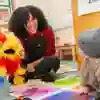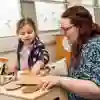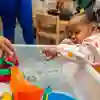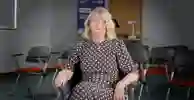




Ready to make a big impact on young children and their families? Look no further.
With our MA in Early Childhood and Education, you’ll learn from some of the best in the field. This rewarding course has babies and young children at its heart and draws on subjects such as education, health studies, social work and social policy, psychology, and sociology. You’ll get a deep understanding and critical view of early childhood studies.
Choose to study whichever way suits you, either one-year full-time or two-year part-time.
About this course
This flexible Masters course takes a holistic approach to the development of young children, from birth to the age of five.
This course explores current critical issues within the early years landscape and explores early child development within a global context, including aspects related to child development, diversity, and culture. You’ll learn all the tools to navigate and understand the evolving landscape of childhood experiences. Through creative inquiry, communication, and playful learning, you’ll also learn how children express themselves through play.
To put your learning into practice, you’ll get the opportunity to carry out an independent research project on a real-world topic of your choice, supported by our experienced tutors who will provide guidance and mentorship throughout.
You have the freedom to customise your learning journey to match your needs. After successfully completing stage 1, you can opt for a Postgraduate Certificate in Education. Alternatively, after stage 2 you can work towards achieving a Postgraduate Diploma in Education. The choice is entirely yours.
We offer modules in both the daytime and evenings, so you can find a pattern of delivery that fits with your other commitments, whether you are working, volunteering or studying full time.

MA Education and Childhood overview - University of Hull
1 min
Module options
For a full Masters degree, you'll study 180 credits over the duration of your course. Some programmes offer a Postgraduate Diploma (PGDip) qualification or a Postgraduate Certificate (PGCert) qualification. For a PGDip, you'll study 120 credits, and for a PGCert, you'll study 60 credits.
Filters
Contemporary and Critical Issues in Education: Theory, Policy and Context
This module forms an essential component of your masters programme. It supports the development of key skills that are necessary for study at Level 7, including the development of core and essential skills relating to critical reflection and critical analysis, alongside an introduction to critical theory. It allows engagement with issues relating to specialist areas relevant to your programme of study while also opening up avenues for broader exploration. Drawing on diverse perspectives from a range of global contexts, it ensures that education is explored across broad and diverse perspectives.
core
30 credits
Early Child Development in a Global Context
In this module you will develop an in-depth knowledge and understanding of children’s development, considering critical contemporary research and international and theoretical perspectives on child development and learning. You will be taught by experts in child development and will examine varying factors that contribute to early child development, including diversity and difference. Issues relating to culture, poverty, gender or disability and key questions such as nature/nurture, which relate to our understanding of children's development, will also be explored.
core
30 credits
Research Methodologies (Education)
You will explore cutting edge research methodologies used in education, developing your critical understanding of how they can be used to address real world problems. An inquiry-based teaching approach will enable you to work with peers to weigh the merits of each in terms of their suitability for particular contexts and issues.
core
30 credits
Creative Inquiry, Communication and Playful Learning
This module focuses on how young children communicate their thoughts, understandings, ideas and emotions through their play. The module encourages you to consider the interconnected nature of children's representational language through play-based activity, such as mark-making, modelling, drawing, role play, construction, movement, music, dance and how children more broadly think imaginatively and creatively.
core
30 credits
Extended Research Project (Education)
This module provides you with an opportunity to apply your knowledge and research skills in the field of education. Supported via dedicated course tutors, your dissertation supervisor, and high-quality workshops and online content, you will undertake an independent research project on a topic related to your programme of study. This will allow you to apply your skills in real-world contexts and gain an understanding of conducting and reporting on research. This module will help you develop key transferable skills for both the workplace and further study.
core
60 credits
Our academics
Our team of highly respected and experienced tutors are all experts in their specialisms.
Taught by a team of experts in the fields of education, social care, health, inclusion and therapeutic approaches, you’ll gain real, practical knowledge that will be invaluable in your future career.

Dr Jo Traunter
Team Lead
Jo’s teaching and research interests are in early childhood education and care. She brings over 20 years’ experience of different early years teaching methods and activities to her role as Head of Subject for Education, Childhood and Youth Studies.

Kerrie Lee
Lecturer
An experienced early years practitioner, Kerrie's research focuses on how environment, space and place interact and shape the lives of young people. She is working on a consultation for new projects to support early years in museums and galleries.
Entry Requirements
What do I need?
When it comes to applying for this Postgraduate Taught degree, you'll need an Undergraduate degree (or equivalent). For this course, you'll need a 2:2 from a relevant bachelor's degree.
The programme is designed for graduates who have a studied a subject that is relevant to this course.
If you’re an undergraduate student at Hull, you’re guaranteed a fast-track route to this postgraduate degree, as long as you meet the entry requirements.
In order to ensure our students have a rich learning and student experience, most of our programmes have a mix of domestic and international students. We reserve the right to close applications early to either group if application volumes suggest that this blend cannot be achieved.
Typical offer
2:2 in a relevant subject area
Applicants should have a minimum of 2.2 Honours degree (or international equivalent) in a relevant subject.
Fees & Funding
How much is it?
Tuition fees for 2027 entry have not been confirmed. Please use 2026-27 information as a guide.
Scholarships
We offer a number of awards, bursaries and scholarships for eligible students. They’re awarded for a variety of reasons including academic achievement and/or to help those on lower incomes.
Scholarships and bursaries are separate to student loans. And the best bit is, you don’t pay a penny back.
Alumni Postgraduate Scholarship
University of Hull undergraduates progressing to a taught masters course may receive a 20% discount on the cost of their tuition fees.
Find out if you’re eligible by visiting the University of Hull Alumni Postgraduate Scholarship page.
See more Scholarships
We offer a range of scholarships and awards to students at the university to help with their financial load.
To view all of our scholarships and determine whether you're eligible, please visit our Scholarships and Awards page.
Our facilities



Future prospects
Our Masters courses mirror the high demand for highly reflective practitioners with excellent critical thinking skills.
The opportunities for graduates in children’s and young people’s services are varied and wide.
Potential future careers include researcher, portage worker, children’s centre practitioner, family support worker, early years practitioner and child support worker.
Take your career to the next level
Like what you’ve seen? Then it’s time to apply.
Make your application online now, and our admissions team will get back to you as soon as possible to make you an offer.
Not ready to apply yet?
We regularly deliver virtual and on-campus events to help you discover your perfect postgraduate course, whether it’s a subject you already love or something completely different. Our events are an opportunity for you to chat to tutors and current students and find out about the career options a postgraduate degree could lead to.
You may also be interested in...
All modules on this course page are subject to availability and this list may change at any time